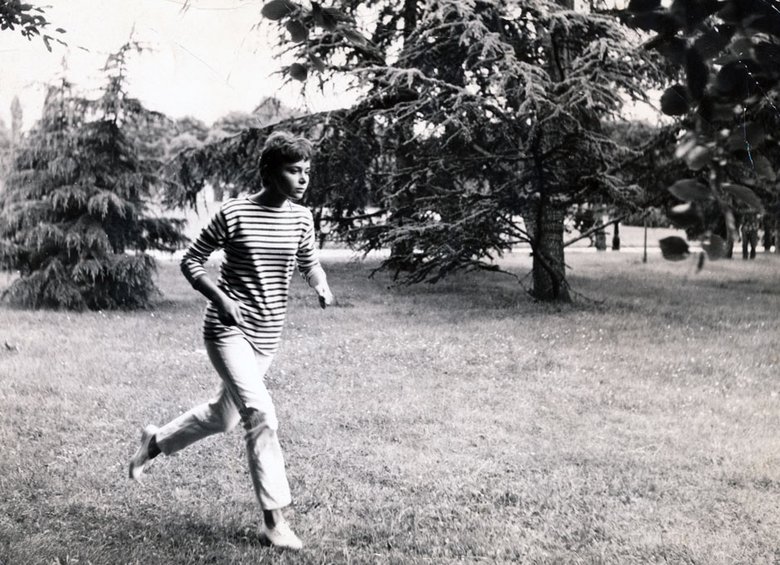【2014 Archives】
2025-06-26 18:12:38
167 views
5947 comments
When the New Wave Was New014 Archives and Other News
On the Shelf

Nadja Tesich in Nadja à Paris, 1964.
- About a decade ago, Jonathan Gottschall pioneered “literary Darwinism,” a school of thought that interprets literature through the prism of evolutionary desires. By bringing biological concerns to English departments, he hoped to rescue the humanities from triviality: “the alternative is to let literature study keep spinning off into a corner of irrelevance to die.” Today, perhaps unsurprisingly, his career “is in a precarious place,” but hey, at least he’s writing trade books …
- Hardly anyone is writing love songs anymore—can we assume, from this, that hardly anyone is in love? “The traditional romantic love song has lately ceased to be as central to American pop music as it still was well into the ’70s. For now, while the pop charts are laden with songs about love, that love is often rendered in an anti-romantic manner that is sharply at variance with how love was customarily portrayed during the golden age of American popular song.”
- Lynne Tillman on David Wojnarowicz, whose photo-book Brush Fires in the Social Landscapewas published twenty years ago: “In the 1980s, being infected by HIV and developing AIDS was an unchosen, horrific fate, fatal. People were very frightened, and felt hopeless. Not every artist or writer responded as Wojnarowicz did. His responses were unique, thoroughly felt, and driven by an urgent necessity. In his time, his work was extraordinarily moving—it stunned. It will never be experienced again as it was then, in that very dark moment.
- “Occasionally, unintentionally, triggered by a smell or an old tune, my mind drifts to that time when Paris didn’t resemble the USA at all … ” Nadja Tesich, the star of Eric Rohmer’s 1964 short filmNadja à Paris, on the French New Wave and filmmaking in the Paris of yore.
- As a boy, Julian Barnes experienced an artistic awakening—and it was Gustave Moreau who made the scales fall from his eyes. “I was uncertain what to make of such work: exotic, bejeweled, and darkly glittering, with an odd mixture of private and public symbolism, little of which I could unscramble. Perhaps it was this mysteriousness that attracted me; and perhaps I admired Moreau the more because nobody told me to do so. But it was certainly here that I remember myself for the first time consciously looking at pictures, rather than being passively and obediently in their presence.”
Search
Categories
Latest Posts
Wordle today: The answer and hints for April 14, 2025
2025-06-26 17:43The most essential fitness tech of 2021 (so far)
2025-06-26 16:23The Morning News Roundup for May 20, 2014
2025-06-26 15:50Life in the Linguistics Lab
2025-06-26 15:47Best iPad deal: Save $132 on Apple iPad (10th Gen)
2025-06-26 15:35Popular Posts
Samsung Unpacked stream is set for May 12, 2025
2025-06-26 18:02The Morning News Roundup for May 20, 2014
2025-06-26 17:58'Quordle' today: See each 'Quordle' answer and hints for August 11
2025-06-26 17:49Why is everyone using their phones in movie theaters?
2025-06-26 16:51Amazon Prime Grubhub deal: Save $10 off orders of $20 or more
2025-06-26 15:45Featured Posts
CPU Price Watch: 9900K Incoming, Ryzen Cuts
2025-06-26 16:25OpenAI expands ChatGPT 'custom instructions' to free users
2025-06-26 16:05What happens to the mind and body when you don't have sex?
2025-06-26 16:01Own a Piece of Paris Review History
2025-06-26 15:46Q&A with tendercare founder and CEO Shauna Sweeney
2025-06-26 15:28Popular Articles
Best JBL deal: Save $10 on the Go 4 at Amazon
2025-06-26 17:30TikTok lets creators label AI
2025-06-26 17:16Feline as Memento Mori
2025-06-26 16:58The “Degenerate“ Paintings of Ernst Ludwig Kirchner
2025-06-26 15:5110 Tech Predictions for 2017
2025-06-26 15:29Newsletter
Subscribe to our newsletter for the latest updates.
Comments (976)
Evergreen Information Network
Hurricane Laura's impact lingered with nightmarish mosquito swarms
2025-06-26 17:47Prosperous Times Information Network
What We’re Loving: Lovers, Lizards, Lowry by The Paris Review
2025-06-26 17:20Fashion Information Network
The Object of Discussion
2025-06-26 16:47Inheritance Information Network
'The Shark Is Broken' review: 'Jaws' behind
2025-06-26 16:43Pioneer Information Network
Amazon Pet Day: All the best deals
2025-06-26 16:01